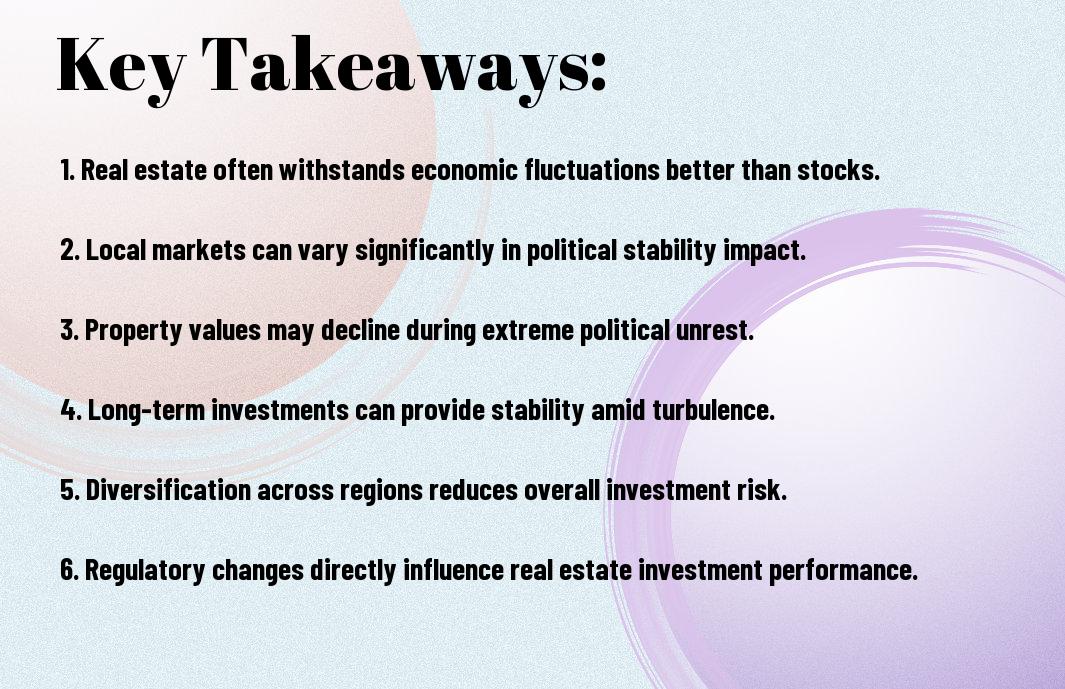Investment decisions often depend on market stability and external factors, including political developments. You may wonder how political turbulence impacts real estate investments and whether they can provide a safe haven during uncertain times. In this post, we’ll explore the resilience of real estate in the face of changing political landscapes, highlighting key considerations that can help you navigate your investment strategy effectively.
Key Takeaways:
- Real estate investments can serve as a hedge against political uncertainty, often retaining value when other assets may be volatile.
- Localized factors, such as market demand and economic conditions, can impact real estate more than broader political events, helping to mitigate risks.
- Investors should consider the regulatory environment and potential policy changes, as these can significantly affect property values and investment returns.
Understanding Political Turbulence
While the notion of political turbulence often conjures fears of instability, understanding its underlying dynamics can clarify its impact on real estate investments. Political turbulence encompasses various events, such as policy shifts, social unrest, and governmental changes, that can disrupt market conditions. As an investor, grasping these complexities allows you to navigate your investment strategies more effectively.
Definition and Types
While there are many facets to political turbulence, you can categorize it into specific types:
- Governmental Changes
- Policy Instability
- Social Movements
- Geopolitical Tensions
- Economic Sanctions
Assume that each type may influence your investment decisions in unique ways.
| Type of Turbulence | Examples |
|---|---|
| Governmental Changes | New leadership, elections |
| Policy Instability | Shifts in regulations |
| Social Movements | Civil unrest, protests |
| Geopolitical Tensions | Trade wars, conflicts |
| Economic Sanctions | Tariffs, embargoes |
Historical Context
With a deeper examination of history, you can see how past political turbulence has affected different markets and economies. Factors like wars, revolutions, and economic crises have often reshaped landscapes and investment opportunities. Understanding these historical precedents allows you to make informed choices today.
Another key point to consider is how political turbulence has prompted shifts in investor behavior through time. For example, during significant civil disturbances, many investors have sought refuge in real estate, viewing it as a more stable investment compared to volatile equities. By looking back at such patterns, you can better anticipate how your investments might react to current events.
Real Estate as an Investment Vehicle
It is undeniable that real estate can serve as a powerful investment vehicle, offering unique benefits compared to stocks or bonds. With its tangible nature, real estate provides both stability and potential long-term gains filled with rewards. As you explore investment opportunities, you may discover that real estate can also diversify your portfolio, providing a level of insulation against market fluctuations and economic uncertainties.
Asset Stability
Any investment in real estate tends to exhibit a high degree of asset stability. This stability is often attributed to the inherent value of property and its limited supply in growing areas. As you invest, you can have confidence knowing that real estate typically holds its worth during market downturns, making it a reliable choice to preserve your capital.
Cash Flow and Appreciation
Below the surface of real estate investment lies the potential for consistent cash flow and appreciation, both of which can significantly enhance your financial run. Property investments can generate steady rental income, contributing to your financial security and allowing you to reinvest or save. Additionally, real estate often appreciates over time, providing long-term capital gains that may enhance your overall wealth.
A key aspect of successful real estate investment is recognizing the dual income potential through cash flow and property appreciation. Rental income generated from tenants can serve as a stable source of cash flow, supporting your expenses or reinvestment efforts. Meanwhile, the value of your property is likely to appreciate over the long term, especially in desirable locations. The combination of these two factors can create a robust financial foundation, positioning your investments for future success.
Political Factors Affecting Real Estate
Now, understanding how political factors influence real estate investments can be vital for your decision-making. Various political elements can lead to fluctuations in market stability, including:
- Legislative changes
- Economic policies
- Taxation regulations
- Government stability
The interplay of these factors can substantially impact your investments.
Legislation and Regulations
Below the surface, legislative changes and real estate regulations often dictate the framework within which your investments operate. New zoning laws, rent control policies, and building codes can directly affect property values and your returns. Staying informed about local and national legislation is critical for strategic decision-making.
Economic Policies and Taxation
Affecting your real estate investments, economic policies and taxation greatly influence the market landscape. Changes in interest rates, fiscal policies, and tax incentives can either stimulate growth or hinder it. You’ll want to keep an eye out for any shifts that could affect your investment strategy.
Consequently, understanding the economic policies and taxation landscape is crucial for you as an investor. Taxation can directly impact your net returns, while fiscal policies may influence market demand. By ensuring you are aware of current economic conditions and proposed policy changes, you position yourself to adapt better to market shifts and optimize your investment outcomes.
Case Studies: Real Estate Performance During Political Crises
All real estate markets respond differently during political upheavals, providing various insights into their resilience. Consider the following case studies that illustrate real estate performance amid political crises:
- Argentina (2001-2002): Real estate prices fell by 30%, yet rental demand remained stable.
- Turkey (2016 Coup Attempt): Despite political instability, housing sales surged by 15% the following year.
- Brazil (2015-2016 Impeachment): Property values dropped by 20%, but commercial real estate saw a 10% recovery within two years.
- U.S. (2008 Financial Crisis): While overall prices decreased by 30%, certain urban areas maintained growth due to job availability.
For more insights on current trends, refer to the Global Real Estate Risk Outlook 2024 – WTW.
International Examples
Behind various international scenarios, you can see how global real estate markets navigate political upheavals. For instance, Germany’s property market remained stable during the Eurozone crisis, with rental yields rising by 2.5%. Conversely, in Venezuela, hyperinflation resulted in a staggering 80% decline in real estate prices, demonstrating vulnerability under extreme political unrest.
Domestic Market Analysis
For understanding how your domestic market fares in turbulent times, it’s important to consider local conditions. Markets in the U.S. have shown to bounce back relatively quickly after political events, with substantial regional differences. Urban areas often recover faster due to their economic opportunities, while rural regions may experience prolonged downturns.
Real estate trends in your area can be significantly influenced by political stability, demographics, and job growth. Historical data indicates that anticipated political decisions can impact housing supply and demand dynamics, leading to shifts in property values. It’s crucial to stay informed on local policies and economic indicators to understand how your investment landscape may change during and after political turmoil.
Risk Mitigation Strategies for Real Estate Investors
Once again, safeguarding your real estate investments against political turbulence requires effective risk mitigation strategies. By employing techniques such as diversification, location selection, and thorough market analysis, you can strengthen your portfolio’s resilience. Additionally, staying informed about legislative changes and market trends helps you adapt quickly, ensuring your investments remain sound despite external pressures.
Diversification
On the other hand, diversification plays a key role in risk reduction. By investing in various property types or different geographical areas, you spread risk across your portfolio. This prevents losses from a single market downturn and offers potential for growth in multiple sectors, providing you with a more stable income stream.
Location Selection
Strategies to select the right location are vital for your real estate success. Analyzing market trends, demographics, and infrastructure developments can inform your investment choices. Properties in areas with strong economic fundamentals tend to withstand political and economic upheavals better than those in unstable regions.
Understanding the local market dynamics is paramount when choosing a location. Investigate factors such as job growth, population trends, and community amenities, as these elements significantly influence property value. Investing in areas with strong demand and upcoming developments can provide you with stability and potential appreciation, helping minimize risks associated with political fluctuations.
Future Outlook for Real Estate Investments
Many experts believe that real estate will continue to be a strong investment option, even amidst political uncertainty. The market is likely to evolve, adapting to new economic conditions and changing buyer preferences. As a savvy investor, staying informed about market trends and regional developments will empower you to make decisions that align with future opportunities.
Trends and Predictions
About the future of real estate investments, experts anticipate a shift towards sustainable and technology-driven properties. The growing emphasis on eco-friendly living and smart home technology suggests that you may want to seek out investments that prioritize these features to attract future tenants or buyers.
Adapting to Change
About navigating political and economic changes, flexibility and innovation in your investment strategy will be key. You might find it beneficial to explore diverse property types, such as residential, commercial, or industrial, to mitigate risks associated with market fluctuations.
Predictions indicate that as global dynamics change, you should be prepared to adapt your investment focus. Understanding emerging markets and consumer demands will allow you to pinpoint opportunities and make informed decisions. By staying proactive, you can enhance your portfolio’s resilience against political turbulence and market volatility.
Final Words
Drawing together the insights on real estate investments during periods of political turbulence, you should recognize that while real estate can provide relative stability compared to other assets, it is not entirely immune to external factors. Your ability to navigate these investments successfully hinges on thorough research, understanding local markets, and remaining adaptable to change. By staying informed and proactive, you can better position yourself to weather any political storms that may affect the real estate landscape.
Q: How do political changes impact real estate investments?
A: Political changes can significantly affect real estate investments. Factors such as changes in government policies, regulations, and economic conditions can influence property values and investment returns. For example, a new administration may introduce tax incentives for property developers or implement stricter zoning laws. Investors should stay informed about local and national political climates, as these can directly affect market trends and property demand.
Q: Are certain types of real estate investments more resilient during political instability?
A: Yes, some types of real estate investments tend to be more resilient during periods of political instability. For instance, residential rental properties often remain in demand, as people always need housing. Additionally, properties in stable markets or regions with diverse economies can provide a buffer against political uncertainties. Commercial real estate, however, can be more susceptible to changes in government regulations and economic policies, making it important for investors to assess market conditions before investing.
Q: What strategies can investors employ to mitigate risks associated with political turbulence?
A: Investors can adopt several strategies to mitigate risks linked to political turbulence. One effective approach is to diversify their real estate portfolios across different markets and property types, which can reduce vulnerability to localized political issues. Additionally, staying updated on policy changes and understanding how they may affect various sectors can help investors make informed decisions. Establishing strong relationships with local communities and stakeholders can also provide insights into emerging opportunities and risks in a fluctuating political landscape.







